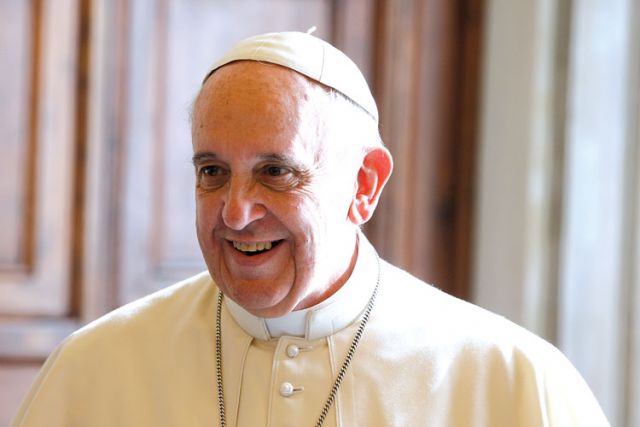First, I am grateful to be a member of a Church which has a leader who is the vicar of Christ on Earth, a man who stands in the shoes of St. Peter and who possesses “full, supreme and universal power over the whole Church” (Catechism, 882).
Second, I honour the reality that, although the Pope is formally elected by cardinals, he is chosen by the Holy Spirit. This is what the Church teaches and it is what I believe; therefore, whoever occupies the office is entitled to the most profound respect and reverence, apart from his personal attributes.
Third, I stand abashed before the humility and simple goodness of the man named Jorge Maria Bergoglio, now Pope Francis. His integrity, modesty, approachability and his constant concern for the poor are qualities so evident as to have commanded near universal attention and respect.
So why, then, is the simple question with which I began this column so difficult to answer?
First, because (as Register columnist Robert Brehl recently wrote) this Pope is “a rock star” and that is just about the least fitting papal description that I can imagine. Pope Francis has been on the cover of Rolling Stone magazine, he is Esquire’s “best dressed man,” he is Time’s “Person of the Year.” Even gay magazines feature him on their covers. But I remind myself that St. Luke admonished us to beware “…when all men speak well of you, for their fathers used to treat the false prophets in the same way.” Celebrity can be poison when taken in quantity. The Church should not want “a rock star” Pope.
Second, it concerns me that those who praise Pope Francis often do so by denigrating his predecessors, Popes Benedict XVI and John Paul II. They were “traditionalists” (about the only term of abuse left in the media’s lexicon), while Pope Francis is a “reformer.” They were “conservative,” Pope Francis is “liberal.” They proclaimed Catholic doctrine, this Pope says, “Who am I to judge?”
Of course the media is superficial about many things, and who really cares what they have to say about the Pope, the Church or the faith? Nevertheless, it is galling to see the reputations of such outstanding popes as John Paul II and Benedict traduced on the basis of one who has occupied the office for less than a year.
But these are comparatively trivial reservations compared to what most concerns me: namely, the tendency of Pope Francis to give flippant responses (e.g. on abortion or, most notoriously, “Who am I to judge?”) to large questions.
Recently, in our local paper, a retired United Church minister suggested that the essence of Christianity could be reduced to two propositions: “Live and let live” and “Who am I to judge?” Of course, he cited Pope Francis as his authority. For readers whose only acquaintance with Christianity is reading such ludicrous twaddle, or even for most minimally-catechized Catholics, this can be dangerous. In other words, for most readers, Catholic and non- Catholic, the Pope’s throw-away line — “Who am I to judge?” — is the only magisterium with which they will likely come in contact.
No amount of quoting the actual catechism will counter-balance the weight of that throw-away line. In any case, the catechism may increasingly come to be seen as part of that dark and superstitious past from which this Pope is valiantly trying to liberate the Church. All the media, or indeed all any Catholic, need do now in order to supersede Church teaching is to echo the Pope’s “Who am I to judge?”
In a similar vein was Pope Francis’ answer to this question put to him in an interview: “Does there exist one unique vision of the good? And who determines it?” To which Pope Francis responded: “Each one of us has our own vision of good and also of evil. We must encourage him to proceed towards what he thinks is good.”
Relativism is the dominant ideology of our time. It is encouraging that Pope Francis understands it; it is disconcerting when he appears to embrace and even proclaim it.
What do I think of the new Pope? Ask me another.
(Hunter is Professor Emeritus in the Faculty of Law at Western University.)


